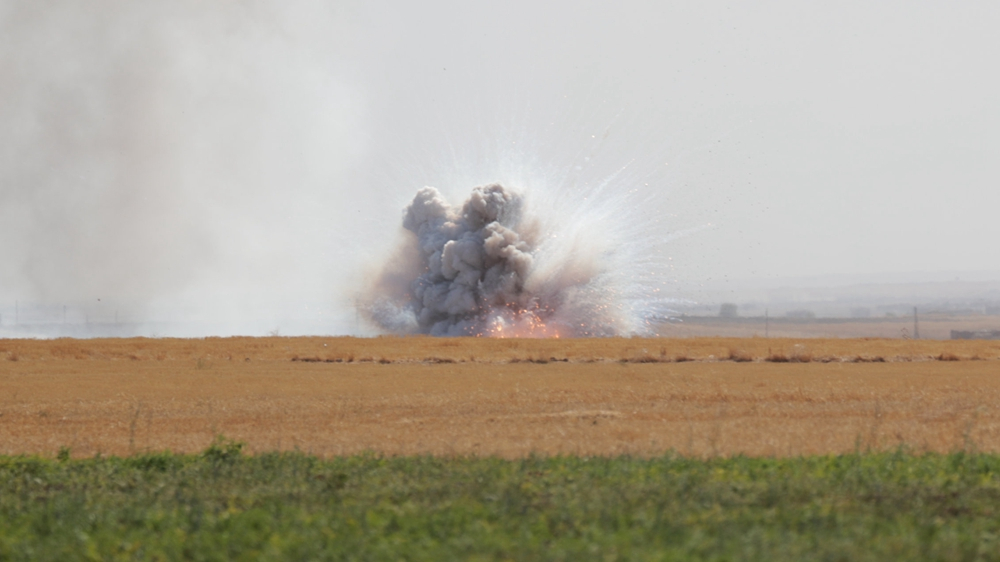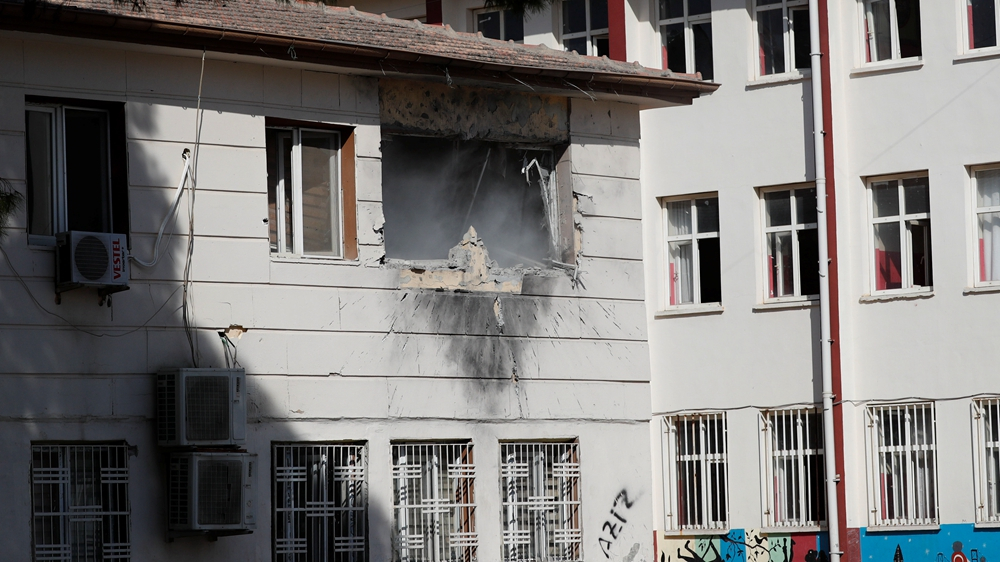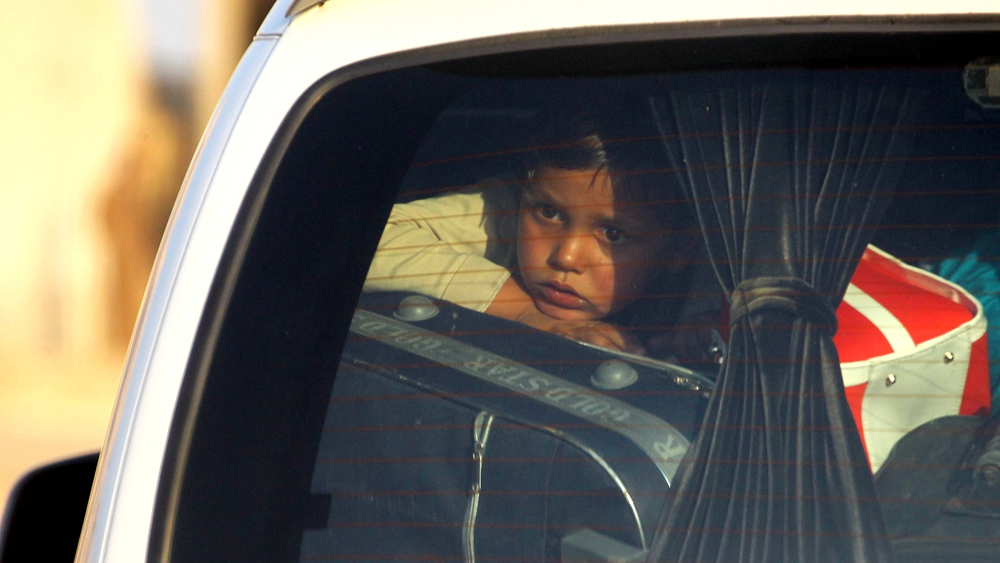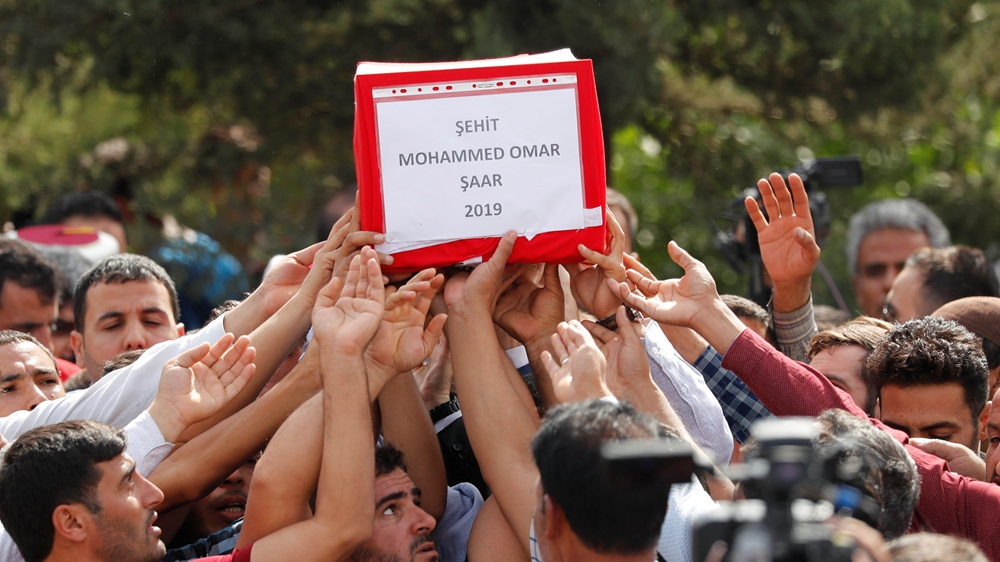
Turkish attacks on Syrian border town. /CGTN Photo
Turkish attacks on Syrian border town. /CGTN Photo
On October 9, Turkey launched a military operation in northeastern Syria against the Syrian Kurdish Group YPG – which Ankara considers a terrorist organization.
For Turkey, there are two main goals behind the operation: To secure its border areas and to establish a safe zone for Syrians to return and settle. Turkish President Tayyip Erdogan says once completed, thousands if not millions of Syrian refugees could safely settle in the region.
The operation was launched following a talk between U.S. President Donald Trump and Turkish President Erdogan. Trump confirmed U.S. troops would be pulled out of the immediate area – which many perceived as a green light from the U.S. for Ankara to smoothly enter the area. Trump has since changed his tone, later saying that the U.S. does not endorse the operation and that he told Ankara it was a bad idea.

Damaged building from mortar shell in Akcakale, Turkey. /CGTN Photo
Damaged building from mortar shell in Akcakale, Turkey. /CGTN Photo
Many other allies are not happy either – the European Council is expected to discuss potential sanctions next week. While U.S. Treasury Secretary Steve Mnuchin has also expressed Trump has given them the authority to impose sanctions as well, ones that would "shut down the Turkish economy." But the U.S. has not activated any sanctions yet.
Politically the pressure is mounting on Turkey. But Ankara seems determined to move forward. On Friday, following U.S. threats of sanctions, Erdogan stated, "We will not stop it no matter what anyone says. We're receiving threats from right and left, saying stop this progress. We will not backtrack anymore."
In the first four days of an air and ground assault, there were losses on both sides of the Turkish–Syrian border. Humanitarian organizations have expressed concern as analysts believe over a hundred thousand people have been displaced inside Syria.

Syrian child fleeing Turkish attack in Tel Abyad. /CGTN Photo
Syrian child fleeing Turkish attack in Tel Abyad. /CGTN Photo
Turkey's initial attacks focused on the Syrian border towns of Ras-al-ain and Tel Abyad. Some civilians there have said they are having difficulty finding food. As of October 12, dozens of YPG militants were reportedly killed inside Syria.
But on the Turkish side of the border, painful scenes emerge as well. Rockets and mortar shells fired from inside Syria have targeted the Turkish border towns of Suruc, Nusaybin and Akcakale.

Funeral of a 9-month-old baby killed by mortar shells in Akcakale. /CGTN Photo
Funeral of a 9-month-old baby killed by mortar shells in Akcakale. /CGTN Photo
By the fourth day of fighting, 18 civilians were killed in these Turkish towns due to shellings. It's been difficult for journalists in the area. The press center in Nusaybin was hit by shellings, leaving two local journalists injured. In Akcakale, the town across Syria's Ras-al-ain, shellings hit an area near the hotel journalists have been staying at.
Despite having suffered losses, Turkish locals in border towns remain defiant. One local, Halifi Cavus says he supports Erdogan "until the very end." He stresses fiercely that "Turkey is not afraid of anyone." Another local adds that Turkey shouldn't be deterred by international pressure, saying "The U.S. says don't enter, Europe says don't enter. They shouldn't listen to anyone, we enter without fear of anyone, we support our government and our soldiers, we are with them. We'd rather die here than leave."

Women run out of their homes after a rocket fired from Syria landed in their neighborhood in the Turkish border town of Akcakale. /CGTN Photo
Women run out of their homes after a rocket fired from Syria landed in their neighborhood in the Turkish border town of Akcakale. /CGTN Photo
But when the issue of their children's safety comes up, the tone changes. Concern overrides the courage and the message is softer.
Harun from Akcakale has children who heard the bombings and were frightened. He also expresses empathy to the parents on the other side of the border. He says, "Children are scared, these are bombs dropping at the end of the day, both on our side, as well as bombings from our side." Harun tells us most of the families in Akcakale have sent their children to relatives at the city center in Sanliurfa, away from the sounds of explosions and the reach of mortar shells. But he ends saying, "We are not afraid, only the children are afraid."